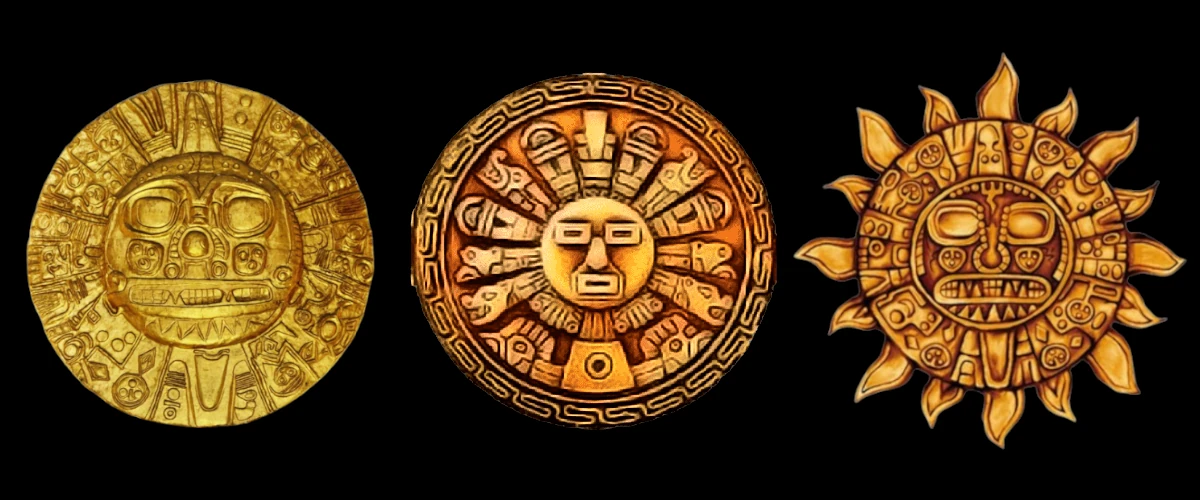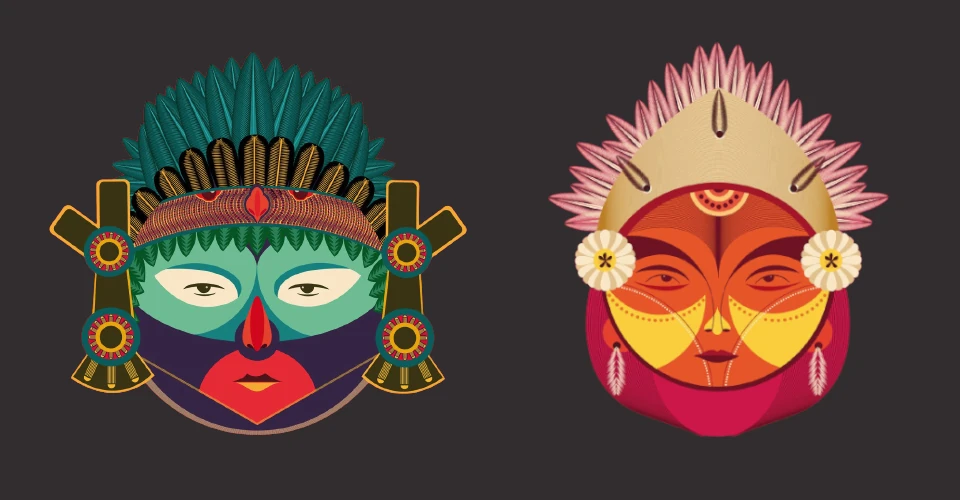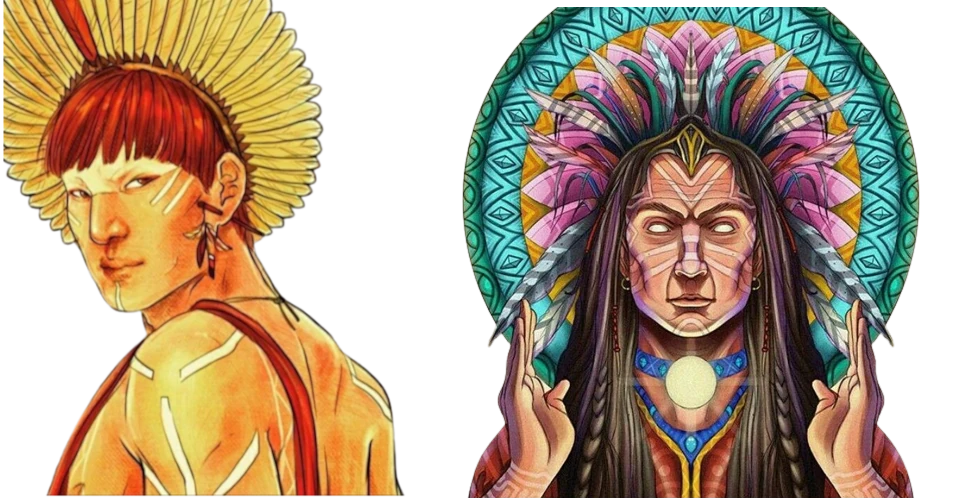Inti

Inti : The Powerful Deity of the Sun
Mythology In the Inca mythology of the Andean region of South America, Inti is the god of the Sun and one of the most important deities. According to legend, he is the son of Viracocha, the creator god. Inti was highly revered as the source of life, light, and warmth, and his worship was an integral part of the Inca culture.
Powers Inti was considered to be all-powerful, and the people believed that his rays could heal and bring prosperity. They also believed that Inti had the power to punish those who disobeyed him or did not pay homage to him. The Inca believed that Inti’s blessings were essential for agriculture and that the god’s strength was a vital factor in the success of their crops.
People Who Worship The Inca civilization worshiped Inti as the most important deity, and his worship was mandatory for all people. Priests dedicated to Inti were responsible for performing elaborate rituals and offerings to the god of the Sun. The emperor of the Inca Empire was believed to be a descendant of Inti, and he was considered the intermediary between the god and the people.
Temples and Monuments The Inca built magnificent temples dedicated to Inti, the most important of which was the Coricancha temple in Cusco, Peru. This temple was made of gold and served as the main religious center of the Inca civilization. The Coricancha was destroyed by the Spanish during the conquest of the Inca Empire, and many of the gold artifacts were taken and melted down.
Festivals and Rituals The Inca celebrated many festivals dedicated to Inti, the most important of which was Inti Raymi or the Festival of the Sun. This festival was held annually in Cusco during the winter solstice, and it lasted for nine days. The celebration included animal sacrifices, processions, and offerings to the god of the Sun.
Inti was one of the most important deities in the Inca civilization, and his worship was integral to their way of life. The god of the Sun was believed to have immense power, and his blessings were essential for agriculture and prosperity. The Inca built magnificent temples dedicated to Inti, and the festival of the Sun was one of the most important celebrations in their culture. Despite the conquest of the Inca Empire by the Spanish, the worship of Inti continues to this day among some indigenous communities in South America.
Pachamama

Pachamama : The Sacred Deity of the Earth
Mythology In the Andean mythology of South America, Pachamama is the goddess of the Earth and fertility. The word Pachamama translates to “Mother Earth” in Quechua, the language of the Inca civilization. According to legend, Pachamama is the source of life and sustains all living beings on Earth. She is highly revered and considered a powerful deity.
Powers Pachamama is believed to have the power to provide abundant crops, maintain ecological balance, and protect the natural world. The Andean people believe that everything on Earth is interconnected, and they worship Pachamama as a way of expressing their gratitude and respect for the planet. The goddess of the Earth is also associated with healing and is believed to have the power to cure illnesses.
People Who Worship The worship of Pachamama is widespread in the Andean region of South America, including countries such as Peru, Bolivia, and Ecuador. The Andean people have a deep respect for the Earth and view it as a living being. They offer their gratitude to Pachamama through offerings, rituals, and ceremonies.
Temples and Monuments Unlike other deities in the Andean mythology, Pachamama does not have temples or monuments dedicated to her. Instead, the Andean people view the entire planet as her temple. They consider mountains, lakes, and other natural landmarks as sacred sites and offer their offerings and prayers to Pachamama in these locations.
Festivals and Rituals The Andean people celebrate many festivals and rituals dedicated to Pachamama. One of the most important celebrations is the Pachamama festival, which is held annually in August. During the festival, people make offerings to the Earth goddess, including food, flowers, and coca leaves. They also perform rituals and dances to express their gratitude and respect for Pachamama.
Pachamama is a sacred deity in the Andean mythology, revered as the goddess of the Earth and fertility. The Andean people worship her as a way of expressing their gratitude and respect for the planet. They offer their offerings and perform rituals and ceremonies to maintain ecological balance and protect the natural world. While there are no temples or monuments dedicated to Pachamama, the entire planet is viewed as her temple, and the Andean people celebrate her through festivals and rituals.
Tupã

Tupã : The Divine Deity of Thunder and Lightning
Mythology In the mythology of the Guarani people of South America, Tupã is the god of thunder and lightning. According to legend, Tupã was the creator of the universe and the guardian of the natural world. He was believed to be the father of all living beings and the source of all life.
Powers Tupã is associated with thunder and lightning, and his power was feared by the Guarani people. They believed that Tupã had the power to control the weather and bring storms, rain, and lightning. The god of thunder and lightning was also associated with fertility and was believed to bring abundance and prosperity to the people.
People Who Worship The Guarani people of South America worshiped Tupã as their main deity. They believed that he was the protector of their land and their crops, and they offered their offerings and prayers to him. Tupã was also considered the guardian of their culture and traditions.
Temples and Monuments The Guarani people did not build temples or monuments dedicated to Tupã. Instead, they worshipped the god of thunder and lightning in their homes and in natural settings. They viewed the entire world as the temple of Tupã, and they offered their offerings and prayers in natural landmarks such as mountains, rivers, and caves.
Festivals and Rituals The Guarani people celebrated many festivals and rituals dedicated to Tupã. One of the most important celebrations is the Jasy Jatere festival, which is held annually in August. During the festival, people offer their offerings and prayers to Tupã, and they perform dances and rituals to express their gratitude and respect for the god of thunder and lightning.
Tupã is the divine deity of thunder and lightning in the Guarani mythology. He was believed to have the power to control the weather and bring abundance and prosperity to the people. The Guarani people worshipped Tupã as their main deity and offered their offerings and prayers in natural settings. They celebrated many festivals and rituals dedicated to Tupã, expressing their gratitude and respect for the god of thunder and lightning.